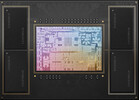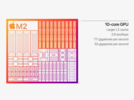Apple M2 Pro 16-Core GPU vs Apple M2 10-Core GPU
Apple M2 Pro 16-Core GPU
► remove from comparison
Die Apple M2 Pro 16-Core GPU ist eine von Apple selbst designte Grafikkarte im Apple M2 Pro 10-Kern SoC und laut Apple mit 16 der 19 Kernen aktiviert (aktuell im Einstiegs-MacBook Pro 14 verbaut). Die GPU hat keinen dedizierten Grafikspeicher aber kann auf den schnellen gemeinsamen LPDDR5-6400? Speicher (unified Memory, 16 oder 32 GB) zugreifen.
Laut Apple soll die 19-Kern-Variante GPU 30% schneller sein als die alte 16-Kern GPU im M1 Pro sein. Daher sollte die 16-Kern-Variante ebenfalls schneller sein als die 16-Kern GPU im M1 Pro (aber nur minimal) und natürlich den direkten Vorgänger mit 14-Kernen deutlich abhängen.
Neu ist beim M2 Pro der Support für HDMI 2.1 (8K Displays).
Die iGPU unterstützt Apple's Metal 2 Schnittstelle und dürfte eine ähnliche Architektur wie die älteren PowerVR Grafikeinheiten (z.B. im Apple A10) aufweisen.
Da der SoC im 5nm Prozess bei TSMC hergestellt wird, sollte die Energieeffizienz hervorragend sein.
Apple M2 10-Core GPU
► remove from comparison
Die Apple M2 GPU ist eine selbst designte Grafikkarte im Apple M2 SoC und laut Apple mit acht oder zehn Kernen. Die 10-Kern-Variante bietet wahrscheinlich 160 Ausführungseinheiten und eine theoretische Maximalleistung von 3,6 Teraflops. Damit ist sie um 1 Teraflop schneller als die alte 8-Kern-GPU im Apple M1 und soll auch größere Caches bieten.
Bei der Performance gibt Apple eine 35% höhere Performance (bei leicht höherem Stromverbrauch von 15 Watt) an. In unseren Benchmarks sehen wir einen Vorsprung von knapp 40% gegenüber dem M1, die 14-Kern-GPU vom M1 Pro bleibt aber deutlich voran.
Die M2-GPU unterstützt Apple's Metal 2 Schnittstelle und dürfte eine ähnliche Architektur wie die älteren PowerVR Grafikeinheiten (z.B. im Apple A10) aufweisen.
Da der SoC im (second generation) 5nm Prozess bei TSMC hergestellt wird (wahrscheinlich N5P), sollte die Energieeffizienz sehr sein. Die GPU nutzt laut internen Tools unter Last in etwa 13,5 Watt (15 Watt laut Apple).
| Apple M2 Pro 16-Core GPU | Apple M2 10-Core GPU | |||||||||||||||||||||||||||||||||||||
| Apple M2 Serie |
|
| ||||||||||||||||||||||||||||||||||||
| Pipelines | 16 - unified | 10 - unified | ||||||||||||||||||||||||||||||||||||
| Speichertyp | LPDDR5-6400 | LPDDR5-6400 | ||||||||||||||||||||||||||||||||||||
| Shared Memory | nein | nein | ||||||||||||||||||||||||||||||||||||
| Herstellungsprozess | 5 nm | 5 nm | ||||||||||||||||||||||||||||||||||||
| Notebookgröße | mittel (15.4" z.B.) | |||||||||||||||||||||||||||||||||||||
| Erscheinungsdatum | 17.01.2023 | 06.06.2022 | ||||||||||||||||||||||||||||||||||||
| Kerntakt | 1398 (Boost) MHz | |||||||||||||||||||||||||||||||||||||
| Stromverbrauch | 15 Watt | |||||||||||||||||||||||||||||||||||||
| Predecessor | M1 8-Core GPU |
|
| ||||||||||||||||
Benchmarks
Cinebench R15 OpenGL 64 Bit + Apple M2 Pro 16-Core GPU
GFXBench T-Rex HD Offscreen C24Z16 + Apple M2 Pro 16-Core GPU
Average Benchmarks Apple M2 Pro 16-Core GPU → 100% n=11
Average Benchmarks Apple M2 10-Core GPU → 63% n=11
* Smaller numbers mean a higher performance
1 This benchmark is not used for the average calculation
Spiele-Benchmarks
Die folgenden Benchmarks basieren auf unseren Spieletests mit Testnotebooks. Die Performance dieser Grafikkarte bei den gelisteten Spielen ist abhängig von der verwendeten CPU, Speicherausstattung, Treiber und auch Betriebssystem. Dadurch müssen die untenstehenden Werte nicht repräsentativ sein. Detaillierte Informationen über das verwendete System sehen Sie nach einem Klick auf den fps-Wert.

Borderlands 3
2019
The Witcher 3
2015
GTA V
2015Average Gaming Apple M2 Pro 16-Core GPU → 100%
Average Gaming 30-70 fps → 100%
Average Gaming Apple M2 10-Core GPU → 57%
Average Gaming 30-70 fps → 61%
| Apple M2 Pro 16-Core GPU | Apple M2 10-Core GPU | |||||||||||||
|---|---|---|---|---|---|---|---|---|---|---|---|---|---|---|
| low | med. | high | ultra | QHD | 4K | low | med. | high | ultra | QHD | 4K | |||
| Diablo Immortal | 59.3 | |||||||||||||
| Call of Duty Mobile | 118.8 | 58.5 | ||||||||||||
| Genshin Impact | 65 | |||||||||||||
| Armajet | 118.4 | |||||||||||||
| Borderlands 3 | 80.8 | 52 | 38 | 28.9 | 64 | 35 | 25 | 16 | ||||||
| Total War: Three Kingdoms | 258 | 75 | 48 | 36 | 22 | 113 | 44 | 27 | 19 | |||||
| Shadow of the Tomb Raider | 159 | 72 | 65 | 57 | 36 | 79 | 35 | 31 | 27 | 20 | ||||
| PUBG Mobile | 39.8 | |||||||||||||
| The Witcher 3 | 51 | 45 | 34 | 28 | ||||||||||
| Asphalt 8: Airborne | 67.7 | |||||||||||||
| Asphalt 9: Legends | 44.2 | |||||||||||||
| Apple M2 Pro 16-Core GPU | Apple M2 10-Core GPU | |||||||||||||
| low | med. | high | ultra | QHD | 4K | low | med. | high | ultra | QHD | 4K | < 30 fps < 60 fps < 120 fps ≥ 120 fps | 1 2 | 1 2 | 3 1 | 1 3 | 1 1 | | < 30 fps < 60 fps < 120 fps ≥ 120 fps | 4 | 3 | 2 4 2 | 4 2 1 | 1 | |
Eine Liste mit weiteren Spielen und allen Grafikkarten finden Sie auf unserer Seite: Welches Spiel ist mit welcher Grafikkarte spielbar?










